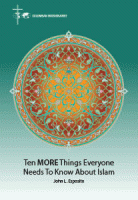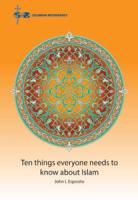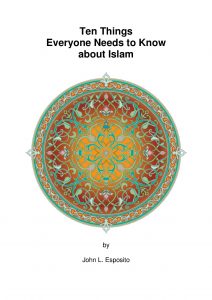Resources
Some materials for promoting, preparing for or practising interreligious dialogue. There are also some resources in the relevant sections of the pages on world religions, as well as in the websites on interreligious dialogue.
Ten MORE Things Everyone Needs to Know About Islam
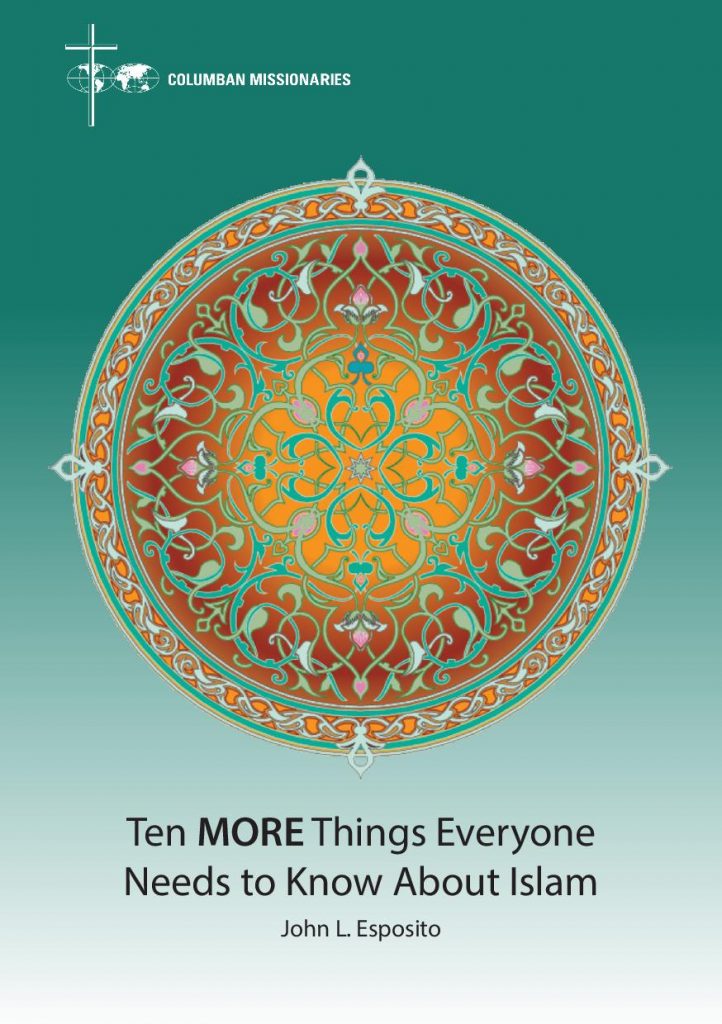 Ten MORE Things Everyone Needs to Know About Islam
Ten MORE Things Everyone Needs to Know About Islam
The Columban Centre for Christian-Muslim Relations is very proud to publish Ten More Things Everyone Needs to Know about Islam.
It contains excerpts from Professor Esposito’s book, What Everyone Needs to Know about Islam.
Professor Esposito is one of the leading experts on Islam in the English-speaking world, the author of many articles and books on Islam and Christian-Muslim relations. His deep familiarity with Islam enables him to provide clear, concise explanations.
We selected ten questions – questions that people ask us, questions you probably ask, questions that are on everyone’s mind:
- “What do Muslims believe about Mary and Jesus?”
- “Why do Muslim women wear veils?”
- “What is jihad?”
- …. and so on.
Professor Esposito provides very clear, simple, readable answers.
We added striking images that complement the text and make the pages very attractive.
Ten More Things is a companion booklet to another booklet we published four years ago, Ten Things Everyone Needs to Know About Islam. Together, these two booklets are a wonderful source of basic information on Islam, Muslims and Christian-Muslim relations. This is especially important when people pick up biased, distorted and unrepresentative reports about Islam in the media. These booklets provide accurate, informed and reliable information that you can trust.
These booklets are ideal for students, teachers, pastoral workers, community workers, priests, concerned citizens, in fact, anyone at all who wants to learn some basic information about our Muslim sisters and brothers and the faith they follow.
I commend to you Ten Things Everyone Needs to Know about Islam and Ten More Things Everyone Needs to Know about Islam.
Set Ten MORE Things Everyone Needs to Know About Islam
| Includes Ten Things Everyone Needs To Know About Islam and Ten MORE Things Everyone Needs To Know About Islam. Price: $12.00 (Price exc P&H) SHOP NOW |
 |
The Golden Rule Poster
 The Golden Rule Poster (Australian)
The Golden Rule Poster (Australian)
The Golden Rule – treat others as you want them to treat you – is a guide for harmonious living. It is found in all religions, philosophies and cultures across the world.
The Golden Rule Poster shows this principle in the sacred texts of thirteen different religions and spiritualities, including the Australian Aborigines.
The Poster can be used in schools, homes, congregations, universities, workplaces, hospitals and prisons for teaching compassion, multicultural and multi-religious cooperation and human solidarity.
- Includes sacred texts from 13 different religions
- Promotes mutual respect and harmony in our multi-religious society
- Provides discussion topics for schools, homes, offices and congregations
A-1 Poster (594 x 841mm)
$11.99 inc GST and $7.00 postage (Australia only)
A-4 pack of 25
$25.30 inc GST + $3.50 postage (Australia only)
Buy direct online at www.columban.org.au/thegoldenrule
The Golden Rule Poster (North American)
The Golden Rule Poster was originally produced by Scarboro Missions. Their website provides links to publishers in Canada and the USA from whom it can be ordered:
https://www.scarboromissions.ca/Golden_rule/index.php
Resources
Scarboro Missions also provides a comprehensive collection of Golden Rule resources: workshop guidelines, school curriculum, mediation exercises, videos, multi-lingual versions, business ethics, the global ethic, ecology, commentaries.
https://www.scarboromissions.ca/Golden_rule/made_of_gold_p11.php
The Golden Rule Institute is a service of International Cities of Peace. The Institute is dedicated to forging a new relationship between our global society and the ancient ethic of the Golden Rule. The Institute encourages, promotes, and publishes scholarly and personal writings, thoughts, articles, and life stories on innovative ways that application of the Golden Rule can foster a culture of personal and societal peace. Check out their website:
http://www.internationalcitiesofpeace.org/programs/golden-rule-institute/
Gensler, Harry J. “Persia and the Golden Rule.” Religious Inquiries 2, no. 3 (2013): 29-46.
Let's Talk, 2017, The Inter Faith Network for the UK
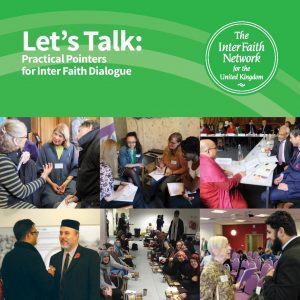 Let’s Talk: Practical Pointers for Inter Faith Dialogue
Let’s Talk: Practical Pointers for Inter Faith Dialogue
The Interfaith Network for the UK
A booklet offering some short reflections and examples drawn from the work of Interfaith Network for the UK and its member bodies, with the aim of inspiring and encouraging further discussion and engagement.
This handy interfaith toolkit is full of useful resources and provides a bird’s eye view of interfaith activity in the United Kingdom. Themes touched on include why dialogue?, dialogue practicalities, dialogue on difficult issues, dialogue over food, limits to dialogue and bi-lateral, tri-lateral & multi-lateral dialogue. It contains practical pointers for dialogue and includes sections on some of the practicalities of dialogue, such as what may make for effective and successful dialogues and how difficult issues may best be approached.
To see an introduction to the booklet and download it from the website see: https://www.interfaith.org.uk/resources/lets-talk-practical-pointers-for-inter-faith-dialogue
For pdf file: Interfaith Network UK, Lets Talk 2017
Looking After One Another, 2017, The Inter Faith Network for the UK
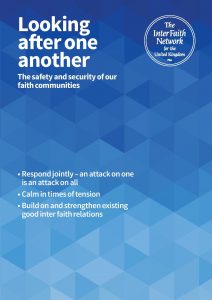 Looking After One Another: The Safety and Security of Our Faith Communities
Looking After One Another: The Safety and Security of Our Faith Communities
The Interfaith Network for the UK
Practical pointers for responding jointly to attacks on places of worship; working for calm in times of tension; and working to build and strengthen good inter faith relations.
This document is published by the Inter Faith Network for the UK (IFN) in partnership with the Department for Communities and Local Government, the Home Office, the Crown Prosecution Service, the National Police Chiefs’ Council and the National Fire Chiefs’ Council.
The document contains guidance on responding jointly to attacks on places of worship; working for calm at times of tension; and working to build on and strengthen existing good inter faith relations. It contains material about how and where to report hate incidents, cyber-attacks, and actual or suspected terrorist activity; where to find information on strengthening the security of buildings; and where to find information about working to build – and strengthen – good inter faith relations locally.
These practical pointers for responding in solidarity have particular resonance at the present time when there is a need to watch out for the wellbeing of any groups who may be targeted because of terrorist actions which claim, or are perceived by some, as having a link to them.
A press release which accompanied the publication of this document can be found on the Press Releases page.
For the website see: https://www.interfaith.org.uk/resources/looking-after-one-another-the-safety-and-security-of-our-faith-communities-2017
For pdf file: Interfaith Network UK, Looking After One Another 2017
Celebrating Mercy with Believers of Other Religions, PCID, 2016
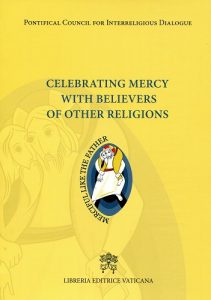 Celebrating Mercy with Believers of Other Religions
Celebrating Mercy with Believers of Other Religions
A concise and simple compendium, edited by the Pontifical Council for Interreligious Dialogue, to live this Jubilee year with our brothers and sisters from different religions. The theme of mercy is actually found in the spirituality of other religious traditions; with this commonality the possibility emerges of sharing moments of spirituality and of interreligious dialogue, as well as concrete works of charity to benefit the needy.
Available as a PDF file: PCID Celebrating Mercy 2016
Also available on the PCID website: http://www.pcinterreligious.org/booklet-celebrating-mercy-with-believers-of-other-religions_372.html
The pdf copies of the document available on the PCID website in English and in Italian are under copyright but can be used strictly in a non-commercial way in the mission and work of interreligious dialogue.
The Catholic Church, ACBC
The Catholic Church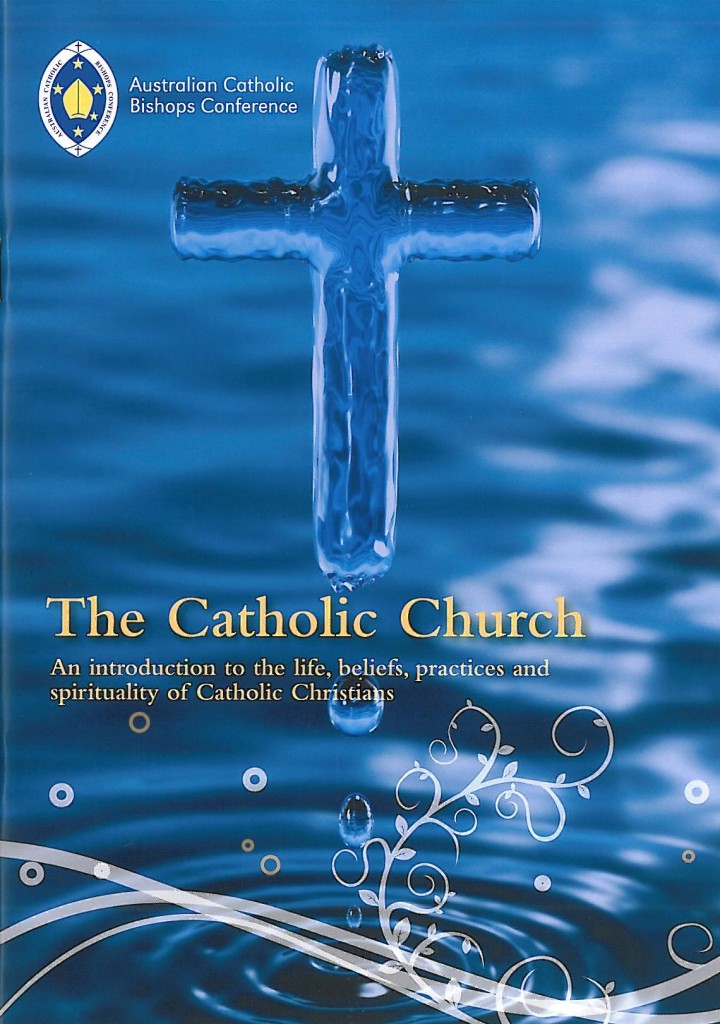
Bishops Commission for Ecumenism and Inter-Religious Relations. The Catholic Church. Canberra: Australian Catholic Bishops Conference, 2011.
This booklet introduces the life, beliefs, practices and spirituality of Catholic Christians. It is written especially to introduce the Catholic Church to believers from other religions, but it can also be used for Christians from other churches, as well as for anyone who wants to find out what the Catholic Church believes and teaches. Based on the Catechism of the Catholic Church, the brochure presents the key elements of Catholic identity and teaching in very summary form. It also gives reference to official Catholic sources where enquirers can find more detailed information on the Catholic Church.
PDF available here: The Catholic Church
© Australian Catholic Bishops Conference
We gratefully acknowledge permission granted by ACBC to make The Catholic Church available on www.columbanird.org.
Hard copies are available for purchase from the website of the Australian Catholic Bishops Conference: https://www.catholic.org.au/shop/acbc-shop
Of Gods and Men, DVD
Of Gods and Men (Des Hommes et des Dieux)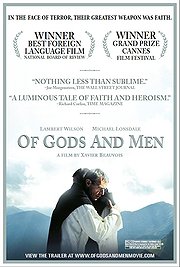
“…. perhaps the best movie on Christian commitment ever made” (New York Times)
The award-winning film “Of Gods and Men” is set in Algeria in the 1990’s. During the protracted and bloody civil war between violent insurgents and the military regime, more than 200,000 people were killed. The French monks of Tibherine refused to take sides in the conflict but lived in solidarity with the suffering Muslim people who were caught in the crossfire. Warned to leave for their own safety, out of dual fidelity to God and to the people, they chose to stay. This decision cost them their lives. The witness of these monks embodies the ideal Christian attitude to Islam and Muslims. Their story inspires us to follow their example of love and service.
The film won the Ecumenical Prize at Cannes 2010. It also won the Grand Prix du Jury from the festival itself.
For the official trailer, stills, and press kit for the release of the film see: http://www.sonyclassics.com/ofgodsandmen/
“One of the finest religious films, and one of the best Catholic films, in years.” For the full film review by Fr Peter Malone MSC see: http://www.signis.net/article.php3?id_article=4005&var_recherche=des+hommes
Dom Christian’s Testament
Dom Christian de Chergé was the prior of the Cistercian monastery at Tibherine. During December 1993 he composed a personal Christian reflection on the dangers he was facing. He completed it on 1 January 1994 and posted it to his family for safe-keeping. The document was opened on Pentecost Sunday 1996 shortly after Dom Christian and others of his Trappist community were murdered in Algeria. It has become known as his personal testament. It is a profound meditation on the meaning of Christian presence and engagement with Muslims.
Click here the text of Dom Christian’s Testament and a reflection by Fr Patrick McInerney.
Other Resources for Of Gods and Men
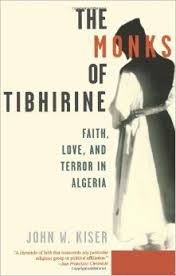 Kiser, John W. The Monks of Tibhirine: Faith, Love, and Terror in Algeria. New York: St Martin’s Griffin, 2003
Kiser, John W. The Monks of Tibhirine: Faith, Love, and Terror in Algeria. New York: St Martin’s Griffin, 2003
The book tells the story of the monks of Tibherine: Book review by Fr Brian Vale.
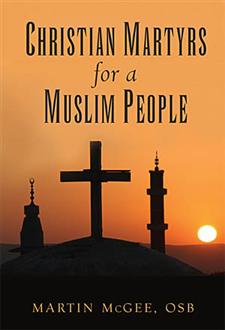 McGee, Martin. Christian Martyrs for a Muslim People. Mahwah, NJ: Paulist Press, 2008.
McGee, Martin. Christian Martyrs for a Muslim People. Mahwah, NJ: Paulist Press, 2008.
The author is an English Benedictine monk. He tells the story of the nineteen priests and religious sisters, including the seven Trappist monks of Tibherine, who stayed in Algeria during the 1990’s and were victims of the violence sweeping that country. Based on their letters, journals and on interviews with people who knew them, he recounts their service and commitment to the country, which included the ultimate sacrifice of laying down their lives.
For Fr Patrick McInerney’s account of the background to the situation in Algeria and the conflict that was raging around the monks of Tibherine.
For further background on the church in Algeria see: http://www.zenit.org/article-30494?l=english
For a Christmas reflection on the Christian response to violence and the non-violent path chosen by the monks see The Ultimate Answer To Violence, Ronald Rolheiser OMI, 12 August 2012: http://ronrolheiser.com/the-ultimate-answer-to-violence/#.VTO3VpM7J2A
For Martin McGee’s review of the film see http://www.catholicherald.co.uk/features/2010/07/01/christian-martyrs-for-the-islamic-world/
For Gareth Vile’s review of the film see http://www.thinkingfaith.org/articles/FILM_20101202_1.htm
For Elizabeth Lev’s review of the film see http://www.zenit.org/article-30844?l=english
For an interview with the script writer for the film see http://www.catholicherald.co.uk/features/2010/12/20/%E2%80%98we-tried-to-portray-their-humanity%E2%80%99/
Ten Things Everyone Needs to Know About Islam
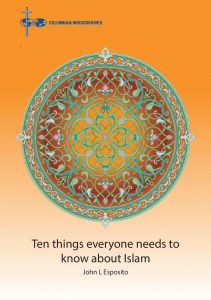 Esposito, John L. Ten Things Everyone Needs to Know About Islam. Essendon, Vic: St Columbans Mission Society, 2016.
Esposito, John L. Ten Things Everyone Needs to Know About Islam. Essendon, Vic: St Columbans Mission Society, 2016.
Professor Esposito is one of the leading experts in Islam in the English-speaking world. He is the editor of encyclopaedias on Islam and the author of over forty books. After the 2001 terrorist attacks in the United States he was called on by the media and government and other audiences seeking explanation of those events. He collated the questions his audiences constantly asked him and in 2002 published his considered answers in What Everyone Needs to Know About Islam. This is an extract from that book and presents his answers to the ten most burning questions that are on everyone’s mind. His answers are clear, direct, balanced and informative.
Who needs to read this text?
Every teacher, social worker, parish worker, priest, religious leader, community organizer, health worker…. Literally, as the title says, everyone!!
This 2016 edition is attractive, accessible and authoritative. Stunning images complement and enhance the author’s text.
We acknowledge gratefully permission from the author to publish.
Ten Things Everyone Needs to Know About Islam (2016) is available for sale from St Columbans online at https://www.columban.org.au/donate/shop/columban-books/ten-things-everyone-needs-to-know-about-islam-booklet.
Ten Things Everyone Needs to Know About Islam was originally published by the Columban Mission Institute in 2010 as a plain text and proved very popular with teachers and students. In 2016 the booklet was completely re-designed with stunning images which complement and enhance the text, making it very attractive. This new edition was published by St Columbans Mission and is for sale as per the above link.
The plain, unadorned text of the 2010 booklet is available for download as a pdf file here: Ten Things Everyone Needs to Know About Islam
The Sultan & the Saint, DVD
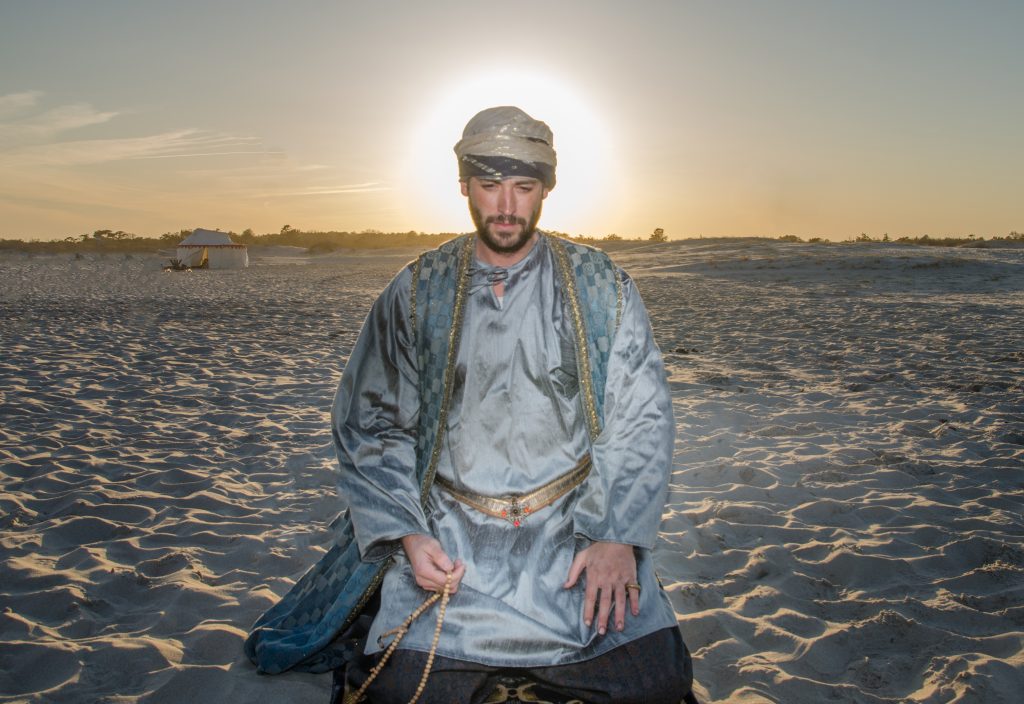
The Sultan and the Saint film tells one of the great, lost stories from history. Set in a past period of East-West conflict, it speaks with urgency to our present. Two men of faith, one a traveling Christian preacher, the other the ruler of a Muslim Empire, bucked a century of war, distrust, and insidious propaganda in a search for mutual respect and common ground. It is the story of Francis of Assisi and the Sultan of Egypt, and their meeting on a bloody battlefield during the period of Christian- Muslim conflict known as the Crusades.

The film tells the story of a little-known encounter between Saint Francis of Assisi and Sultan Malik Al-Kamil, who met during the Fifth Crusade and were each transformed in notable ways. Told with cinematic-style reenactments and interviews with renowned historians, art experts, religious thinkers, and brain scientists, the film centers on these two men of faith, who had an improbable meeting during a terrible period of religious conflict between their faiths, and discovered a way of finding peace between them.

In 1219, during the worst days of the Fifth Crusade, across a grim battlefield groaning with death and horror, Malik Al-Kamil, nephew of Saladin and Sultan of Egypt, welcomed two odd-looking Christians into his well-appointed tent. They were humble friars, men of a religious order pledged to poverty and nonviolence, dressed in rough robes and bare feet. Their heads were shaved, their cheeks hollowed from the deprivations of their devotions. They had risked everything to cross these battle lines. But the lead friar, a man named Francis of Assisi, modeled his whole life in the imitation of Jesus Christ, and was seeking to bring an end to the decades-long war between Christians and Muslims.

When Francis departed, he left with a deeper understanding of Islamic spirituality that was reflected in later writings that urged Catholics to treat Muslims with greater respect. Al-Kamil continued to welcome all opportunities to engage and discuss with the Christians, and a few years later, he succeeded in concluding a treaty with the Holy Roman Emperor that finally ended the suffering of the bloody Fifth Crusade.
For further details see: www.sultanandthesaintfilm.com
This is a report of the premiere of The Sultan and the Saint of the FranciscanAction website: https://franciscanaction.org/article/world-premiere-sultan-and-saint-receives-enthusiastic-reviews
The Imam and the Pastor, DVD
The Imam & the Pastor 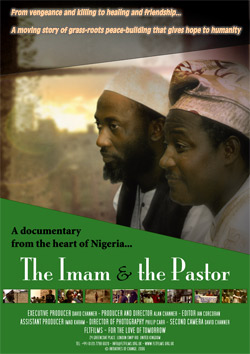
Pulsating with the vibrant colours and music of West Africa, the film offers a message of hope for the world from an unexpected quarter.
At a time when many in the world are wondering whether friendly relations are possible between those of Muslim and Christian background, the Nigerian protagonists of this film assert emphatically that they are.
In recent decades, Nigeria has been rocked with alarming frequency by ethnic and religious conflicts, with tens of thousands killed and whole communities devastated.
In the 1990’s, Pastor James Wuye, a Pentecostal Minister, and Imam Muhammad Ashafa, a Muslim leader, led opposing armed militias, dedicated to defending their own church and mosque communities as violence broke out in Kaduna, northern Nigeria. In pitched battles Imam Ashafa lost his uncle and two cousins, and Pastor Wuye lost his arm to a machete blow. Their personal losses fuelled their hatred for each other. They became sworn enemies, even to the extent of trying to have the other killed.
Now the two men are co-directors of the Muslim-Christian Interfaith Mediation Centre in their city, leading task forces to resolve conflicts across Nigeria.
The Imam and the Pastor tells how they made this remarkable transition. It is both a moving story of forgiveness and a case study of a successful grassroots initiative to rebuild communities torn apart by conflict.
To see the film: https://www.youtube.com/watch?v=kFh85K4NFv0
“Theirs is an inspiring story, full of hope … A model for Christian-Muslim relations.” Dr. Rowan Williams Archbishop of Canterbury
The film received the Peacemakers in Action Award presented by the Tanenbaum Center for Inter-Religious Understanding (NY) in 2000.
Click here for the text of the Kaduna Peace Declaration
Click here for the text of the Yelwa Shendam Peace Affirmation
As an exercise in interfaith dialogue, compose a peace declaration that is relevant to your situation to which you and your dialogue partners can commit! Publicise and promote your shared commitment in your local media.
Religion in Dialogue in Korea, Fr Eamon Adams, DVD, 2018
Irish Columban, Father Eamon Adams, has been working in Korea for many years. He has expertise in interreligious dialogue, especially with Buddhists. In this video some of his dialogue partners share their reflections on interreligious dialogue.
Bridges, Christian-Muslim Relations
Bridges, Centre for Christian-Muslim Relation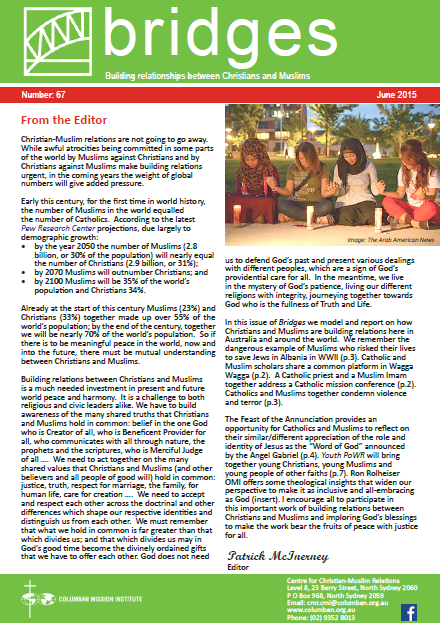 s
s
Bridges is the free, quarterly newsletter of the Columban Mission Institute’s Centre for Christian-Muslim Relations. It contains news from the Centre, news from the world, feature articles on Islam and interreligious dialogue and coming events.
Subscribe on-line on the ANZ Columban website at http://www.columban.org.au/publications/bridges/index/.
Back issues are available at: http://www.columban.org.au/publications/bridges/back-issues
Religious Feast Day Greetings
Religious Feast Day Greetings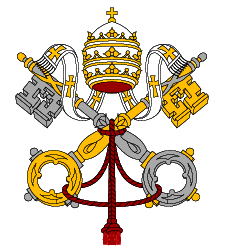
The Pontifical Council for Interreligious Dialogue sends greetings to the members of the different religions on the following occasions:
- to Buddhists for the Feast of Vesakh
- to Hindus on the occasion of the Feast of Deepavali
- to Jains on the occasion of the feast of Mahavir Jayanti
- to Muslims for the end of Ramadan
- to Sikhs on the occasion of the feast of Prakash Diwas
You can download them from the PCID website and print/e-mail them to your dialogue partners. See http://www.vatican.va/roman_curia/pontifical_councils/interelg/index.htm
Calendar of Religious Feast Days
Calendar of Religious Feast Days
Since some feasts are on fixed dates while others follow lunar years or other calculations, here are some multi-religious calendars of the feast days of the various world religions:
- Interfaith Calendar: http://www.interfaith-calendar.org/index.htm
- Calendar of Holy Days: https://ucsfspiritcare.org/calendar-of-holy-days/
- Diversity Resources: https://www.diversityresources.com/interfaith-calendar-2022/
- Faith Communities Council of Victoria/Holy Days: http://www.faithvictoria.org.au/calendar
- Religious Calendar: http://theinterfaithobserver.org/religious-calendar/
- When Is – Dates of Religious and Civil Holidays Around the World: http://www.when-is.com/
- Days of Religious Significance, Multicultural NSW: http://multicultural.nsw.gov.au/communities/communities/days-of-religious-significance/
- http://www.huffingtonpost.com/2015/01/16/religious-holidays-2015_n_6426112.html
- http://www.xavier.edu/jesuitresource/online-resources/Calendar-Religious-Holidays-and-Observances.cfm
N.B. Some feasts begin at sunset the evening before and end at sunset of the following day.
World Interfaith Harmony Week
World Interfaith Harmony Week, the 1st – 7th February each year, is another opportunity to arrange or attend interfaith and multi-faith events: http://worldinterfaithharmonyweek.com/
Civic Feast Days
International and national civic days of celebration e.g. anniversaries of foundation, independence and commemorations of significant national leaders and events, also provide opportunities for believers from different religions to come together to demonstrate their shared citizenship and contribution to society.
- United Nations International Days: https://www.un.org/en/observances/international-days-and-weeks
- United Nations Women Watch Events Calendar: https://www.unwomen.org/en/csw/csw65-2021/side-events
- Global Dimension: https://globaldimension.org.uk/events/
- Holidays and Observances around the World: http://www.timeanddate.com/holidays/
- Calendar of Cultural and Religious Dates, Department of Home Affairs, Australia: https://www.harmony.gov.au/events/landing
A Global Ethic
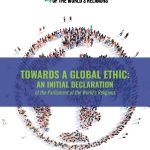 A Global Ethic
A Global Ethic
“Declaration Toward a Global Ethic”, Parliament of the World’s Religions, 4 September 1993.
“Drafted initially by Dr. Hans Kung, in cooperation with CPWR staff and Trustees and experts drawing on many of the world’s religious and spiritual traditions, Towards a Global Ethic: An Initial Declaration identifies four essential affirmations as shared principles essential to a global ethic.
Affirming respect for all life, economic justice and solidarity, tolerance and truthfulness, and equal rights and partnership between men and women, the document elaborated eloquently on the significance of each value for our modern world. Endorsed at the 1993 Parliament of the World’s Religions in Chicago, USA, Towards a Global Ethic urges all men and women of good will to join in the commitment to these vital shared principles.
Used throughout the world by universities, religious and spiritual communities and interfaith organizations, Towards a Global Ethic has emerged as one of the most significant building blocks in the continuing process of creating global ethical understanding and consensus.”
Available as pdf from Urban Dharma website: http://www.urbandharma.org/pdf/ethic.pdf
Available as pdf from Parliament of the World’s Religions website: http://www.parliamentofreligions.org/_includes/fckcontent/file/towardsaglobalethic.pdf
N.B. UPDATED IN 2018
For the first time in history, representatives of all the world’s religions agreed that there are common ethical commitments foundational to each of their traditions:
- Human beings should be treated humanely
- The Golden Rule of reciprocity
- A commitment to peace and justice
These were spelled out in four directives. A fifth directive was added in 2018.
- Commitment to a Culture of Non-violence and Respect for Life.
- Commitment to a culture of solidarity and a just economic order.
- Commitment to a culture of tolerance and a life of truthfulness.
- Commitment to a Culture of Equal Rights and Partnership Between Men and Women.
- Commitment to a Culture of Sustainability and Care for the Earth.
Click here for the updated Towards a Global Ethic: An Initial Declaration of the Parliament of the World’s Religions 2018.
Interfaith Marriages
Introduction
In our multi-religious societies of today, where believers from different religions are living, working and socialising side-by-side, it is inevitable that some of those who fall in love and want to marry will belong to different religions. Such interfaith marriages are a particular form of interreligious dialogue. They are not just occasional interfaith encounters or meetings, such as those in which most interfaith activists engage, but they embrace the whole of life, including spousal intimacy and life-long commitment.
As such, interfaith marriages are a blessing and a witness for the individuals, for their families and for their societies, of the power and depth and reach of interreligious dialogue. However, they also have many challenges. These may include issues of acceptance of the fiancée /spouse by partner’s family, permissibility of such marriages in the laws of their respective religions, who is to conduct the marriage ceremony and how to make it inclusive of both religions, the religious formation of the children and the observance of different religions in the one household. Accordingly, interfaith relationships and marriage need particular guidance and support.
As attitudes, customs, practices and law vary in different countries, we recommend that people in interfaith relationships seek advice from the religious leaders in their country who are sympathetic to the pastoral and religious issues involved. However, we do provide for study some resources which address the possibilities and challenges of interfaith marriages.
The Interfaith Marriage Network
“We’re in mixed marriages ourselves and we’ve listened to many other people in interfaith, intercultural and international relationships. We started the Interfaith Marriage Project because we realized that very little help or information was available for people like us, and couples and families often have to face the issues alone. As more and more people are forming relationships with partners of other faiths and cultures, it’s important for us to support one another.”
http://www.interfaithmarriage.org.uk/index.html
The Resource Pack provides detailed information: http://www.interfaithmarriage.org.uk/resource_packs/Resourcepack.pdf
FABC Paper, No 127
“A Few Theological and Pastoral Perspectives of Interfaith Marriages”, Edited by Fr. Vimal Tirimanna, CSsR, 2007 (88 pages)
http://www.fabc.org/fabc%20papers/fabc_paper_127B.pdf
Victorian Council of Churches
“Interfaith Marriages: Some Pastoral Guidelines”, Commission on Living Faiths, Dialogue and Community, of the Victorian Council of Churches, 2010 (36 pages)
http://www.cam.org.au/Portals/1/VCC%20Interfaith%20Marriage%20Booklet.pdf
United States Conference of Catholic Bishops
Among the many documents on the resources page of the Secretariate for Ecumenical and Interreligious Affairs is the 2011 document prepared by the Mid-Atlantic Dialogue of Catholics and Muslims: Marriage: Roman Catholic and Sunni Muslim Perspectives.
Christian Muslim Forum, UK
With specific reference to marriages between Muslims and believers from other religions:
“When Two Faiths Meet: Marriage, Family and Pastoral Care – Ethical Principles for Ministers, Imams and Other Faith Leaders”, by the Christian Muslim Forum, UK, 2012 (16 Pages)
http://christianmuslimforum.org/images/When%20Two%20Faiths%20Meet%20guidelines.pdf
N.B.
There may be local, national, religious legal restrictions on interfaith marriages, so always check with the local religious leaders of both partners involved in or intending such marriages.
Religions for Peace, Resource Guide on Climate Change, 2016
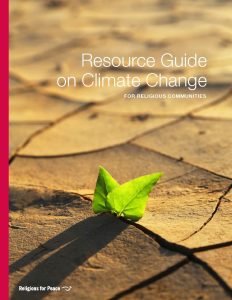 RfP Resource Guide on Climate Change
RfP Resource Guide on Climate Change
This resource guide on climate change is intended for the use of religious communities from all faiths and from all corners of the world. It is divided into three chapters:
Chapter 1: Understanding the Causes and Consequences of Climate Change
Chapter 2: The Moral and Religious Imperative
Chapter 3: Solutions and the Role of Religious Communities
Download here: https://rfp.org/wp-content/uploads/2017/09/RfP-Resource-Guide-on-Climate-Change.pdf
Principles, Fr Ron Rolheiser OMI, 2015
Fr Ron Rolheiser OMI is a prominent figure in contemporary Catholic spirituality whose feature column in the Canadian newspaper, The Western Catholic Reporter, is now carried by 100 newspapers worldwide.
In this reflection, Fr Rolheiser draws on theology to offer ten principles to guide our exchanges with people from other religions.
Website: http://ronrolheiser.com/en/#.VToV6pM7J2C
Reflective Structured Dialogue, 2014
Reflective Structured Dialogue: A Dialogic Approach to Peacebuilding
Created by the Interfaith Mediation Centre, Public Conversations Project, University of Massachusetts Boston and Collaboration Specialists, 2014
PDF File available here: A Dialogic Approach to Peacebuilding
IRD Manual, Missionary Society of Saint Columban
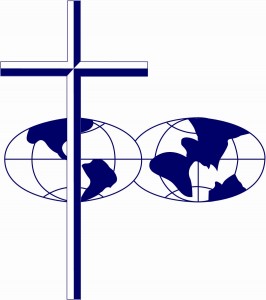
Many Columbans have had very diverse experiences of interreligious dialogue (IRD) in different countries and in various different religious and cultural contexts. This MSSC IRD MANUAL is a collection of these diverse experiences and collective insights of Columbans and others. It is tailored specifically for those who are currently training to be Columban Missionaries (both lay and ordained) and who will be entrusted with the Columban missionary commitment to dialogue into the future.
Please feel free to use this resource: MSSC IRD MANUAL
How To Be Christian While Honouring My Neighbour Who Isn’t , 2002
How To Be Christian While Honouring My Neighbour Who Isn’t
Quotations from Various Sources collected by JW Windland, founding Director of ENCOUNTER WORLD RELIGIONS CENTRE
390 Speedvale Avenue East
Guelph, Ontario N1E 1N5
519.822.0099
Copyright 2002 © JW Windland
Not to be copied or reproduced in whole or in part without specific written permission
Scriptural Reasoning
Scriptural Reasoning is a practice of inter-faith reading. Small groups of Jews, Christians and Muslims, and sometimes people of other faiths, gather to read and reflect on short passages from their scriptures together.
For further details, resources, videos and instructions see: http://www.scripturalreasoning.org/
Spanish Resources
Interfaith Dialogue Directory of Spanish-speaking countries
Dear interfaith colleagues: We are happy to share with you this directory which features inter-religious activity in 20 Spanish-speaking countries. Included here are websites of inter-religious organizations as well as news articles about relevant activities and events. Also included are websites of specific religions in some countries, for example, Buddhism, Judaism, Christianity, Islam and Hinduism. This is not meant to be a comprehensive directory – we, therefore, invite any Spanish-speaking interfaith groups not included in this directory to send us information about their work. It is estimated that there are 550 million Spanish-speaking people throughout the world, most of whom reside in Latin America and the Caribbean. Approximately 45 million people live in Spain. To view or download this directory, see attachment.
Please consider forwarding this directory to colleagues and friends and posting it on websites and social media. For your Spanish-speaking colleagues, see below the Spanish version of this announcement.
Directorio de Organizaciones Dedicadas a Dialogo Inter-religioso en el Mundo Hispano
Queridos colegas en Interfé: Nos complace compartir con ustedes este directorio, en el cual muestra la actividad en el área de diálogo inter-religioso en 20 países de habla Hispana. No sólo incluye páginas de internet de organizaciones dedicadas al diálogo inter-religioso, sino artículos de noticias acerca de actividades y eventos pertinentes al tema. También incluye páginas de grupos religiosos específicos, por ejemplo, Budistas, Judíos, Cristianos, Musulmanes e Hindúes. Nuestro directorio está en continua construcción, razón por la cual invitamos todos los grupos interfé de habla Hispana que todavía no estén listados a que nos envíen su información. Se estima que aproximadamente 550 millones de personas alrededor del mundo son de habla Hispana, una gran mayoría de los cuales se encuentran en América Latina y el Caribe, y 45 millones en la península Ibérica. Para ver o descargar el documento refiérase al archivo adjunto.
Por favor considere reenviar este directorio a colegas y amigos o compartirlo en sus páginas de internet y redes sociales.
Gracias
Paul McKenna
Scarboro Missions Interfaith Dept.
2685 Kingston Road
Toronto, Ontario
Canada M1M 1M4
www.scarboromissions.ca
Tel. 416-261-7135 ext. 296

